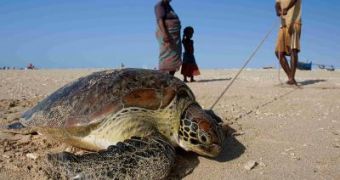16,000 endangered turtles are captured every year by villagers in a single region of Madagascar, despite a government ban, according to a new research carried out by the University of Exeter and Blue Ventures Conservation.
“We conducted this study because we know this small-scale, artisanal fishing is going on despite it being illegal to catch turtles under Malagasy law,” said Dr Annette Broderick, from the Center for Ecology and Conservation (Cornwall) at the University of Exeter.
“Because turtles are an endangered species, it's important for us to know what's going on in the region so we can work with the local community to find a sustainable way forward.”
The study monitored the harvest of marine turtles at 12 villages on the coast of Madagascar, and registered 699 marine turtles being caught, including four species, with most of them being green turtles.
After combining this data to previous studies in the same region, the researchers got to an annual turtle catch in the south-western province of Madagascar of 10,000-16,000.
These figures are estimations, but this is actually the first direct evaluation of turtle exploitation on the island.
Small-scale fishing is widely extended and it is rather difficult to monitor, because of the limited access to these remote areas, but this study could help finding a way of having a sustainable turtle fishing in the region.
The research involved locals by paying a village representative to document every turtle caught and take pictures of each one.
Frances Humber, from Blue Ventures Conservation, explained that “catching turtles for their meat is an important part of Malagasy culture for many coastal people, but the villagers also understand the importance of ensuring the future of this resource.”
This new approach “is a great way of involving communities in the process of finding a sustainable way forward.
“Obviously we can't be sure every turtle catch is reported, so we view the figures from this study as a conservative estimate which is still nevertheless very valuable for informing policy.”
Humber admits that the figures from the study are very concerning, but insists Madagascar should not be pointed out as the only culprit.
“We'd expect similar harvests in many countries in the tropical coastal developing world, so this isn't an isolated issue, but clearly it is a cause for concern when dealing with endangered species,” she added.
“It's possible the model for this study could be used elsewhere to get a better idea of numbers.
“Until we get more details, it's difficult to draw conclusions about what is sustainable and how we can find solutions.
“Clearly making turtle fishing illegal hasn't worked, so we need to work with communities to promote sustainable practices."
The research will be published in Animal Conservation.

 14 DAY TRIAL //
14 DAY TRIAL //